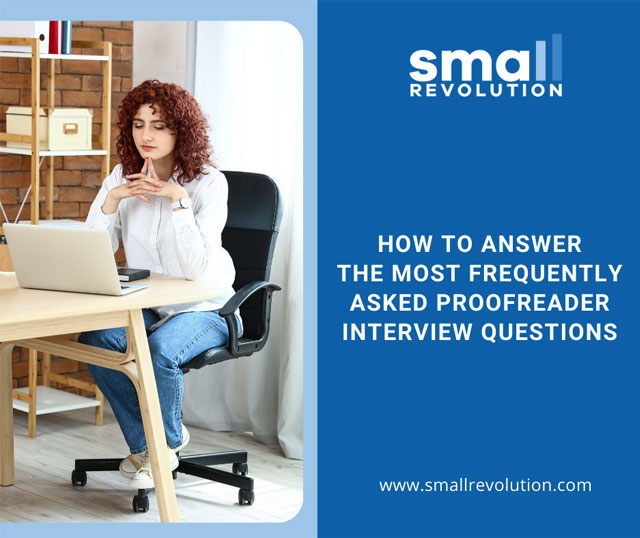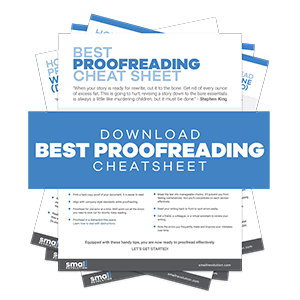Have you had multiple proofreader interviews but never seemed to qualify despite having the necessary experience and credentials?
The ability to answer interview questions in a manner that proves you are the best candidate can be difficult. However, if you adequately prepare before the interview, you can land any job.
The good thing about interviews is that you can often predict the questions that will be asked. This comes down to there being some specific questions that are always asked.
We’ve compiled a list of the most frequently asked interview questions that you can expect as a proofreading candidate, and the best answers you can give.
What Past Proofreading Experience Do You Have?
The intention as you answer this question is to show your expertise.
Start with a general answer of your number of years of experience as a proofreader and the various projects and organizations that you’ve worked with.
From here, you need to get specific and show tangible evidence of your work.
Ensure you have a portfolio of your previous work. We suggest Word documents where you’ve included comments on the areas that need to be corrected.
Take this opportunity to demonstrate your proofreading process. Explain the key things you look out for when proofreading and how they improve the content.

Share an Experience in Which Your Attention to Detail Had Significant Consequences
When answering any question, remember that you want to demonstrate how you will bring value to the organization.
Every business wants two things: to protect their brand and to increase profit. The easiest way to demonstrate your value is to showcase how your work did one or both of these things.
An example might be a company brochure that included outdated information or incorrect figures. Perhaps you caught these errors before the brochure made it to print, thereby saving the company the cost of reprinting.
What Are the Key Things You Look at in a Piece of Content as a Proofreader?
Every organization will have a set of policies and guidelines for its content. This list will include terminology and formatting information that are most important to their brand.
There are some basic things that every proofreader should check in every piece of content. You’ll want to state what is most critical to you and why focusing on this area will help the organization meet its content goals.
The table below illustrates what to look for when proofreading and how you can explain these points during an interview.
| Proofreading Points | Vital Issues |
| Spelling and grammar |
|
| Proper nouns |
|
| Sentence structure |
|
| Consistency |
|
| The flow of the document |
|
How Will You Improve the Content of the Organization?

This question tests your ability to analyze things, spot opportunities for improvement, and offer solutions for problem areas.
Ensure that you review the company’s content before the interview and make a list of improvements.
Remember, you want to show them the value you will add to the company, and this is a fantastic way of doing so.
Have a few issues at the back of your mind—we would suggest a maximum of three things you’ve spotted in their content that need improvement—and offer polite criticisms.
Remember to also provide suggestions for improvement.
A few things to look out for: long sentences, too much jargon and unclear calls to action.
A bank may use so much banking language that a client is confused. How can you help them translate their content into simple and clear concepts?
A good example is the term “non-performing assets” which can be translated to “unpaid loans.” Create value by simplifying their content.
How Do You Handle Giving Feedback to Writers?
Giving feedback to writers is part of your job description. The trick here is to demonstrate that you’ll encourage and educate the writer rather than criticize their writing.
Give specifics on how you’ll accomplish this. Do you prefer to do this in writing or in person? Do you have a particular process you employ?
For example, you may start by praising what they’ve done well before pointing out what needs to be corrected, and why it’s essential to look for such errors.
One of our favorite ways to answer this question is to show that you’ve compiled online resources and training based on the general weaknesses that you’ve seen in writers.
Examples of training you could mention in the interview include How to Write with Rhythm. Be sure to offer two to three tips that you would include with the training, such as varying sentence length.
Do You Work Well in a Team?

The ability of an organization to work as a team is crucial to its success. The best way to answer this question is to show that not only do you work well in a team, you also contribute to its success.
Give examples of how you have been a team player in the past.
Pro tip: Make sure the answer includes something that is outside of the normal work day.
For example, are you a member of the end of year party organizing committee?
- Show how you used your networking skills to get amazing suppliers for the party.
- Explain how you negotiated prices to create an amazing party at a low cost.
By answering in this way, you’re letting the interviewer know that your range of skills goes beyond proofreading and that you’re able to add value to other areas of the team.
How Would You Define Success as a Proofreader?
What is important to you as a person? What are your priorities and principles?
Pro-tip: Do not mention monetary success for this question; instead, stick to growth in your career, such as:
- Team recognition when something is done well
- Work-life balance, having time to spend with your loved ones and other passions
- Job satisfaction
- Becoming a household name in the content and publishing world, because you’ve mastered the art of the written word
These all show what professional success means to you and how the employer can support you in reaching your goals.
Pro Tips to Help You, Excel, at Your Proofreader Interview
As a proofreader, if you have prior experience and understand what makes content successful, you can face your interview with confidence. Here are a few more tips to help you excel:
- Always research the company you’re interviewing for and try to understand their culture. This will help you better tailor your answers to their way of doing things.
- Always give straight answers, even if that means being honest about not knowing something. It’s better to say you don’t know than waste the interviewer’s time.
- Research potential questions like the ones listed above and practice your answers.
- Have your key selling points in mind; why they should hire you. Have at least three points ready about why you’re the best candidate for the job. It’s also essential to have some answers handy regarding why you want to work in their organization.
- Constantly improve your proofreading skills with short courses and training to help you level up.
Small Revolution is on a mission to ensure you succeed as a proofreader—whether that’s during the interview or afterward in your new role.
Check out our courses to help you level up in your career.
Share on Facebook:



